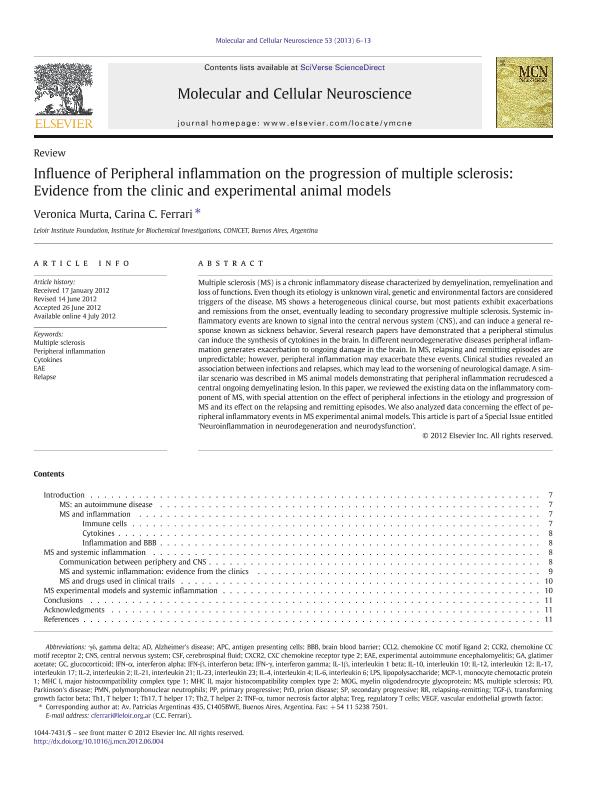Mostrar el registro sencillo del ítem
dc.contributor.author
Murta, Verónica

dc.contributor.author
Ferrari, Carina Cintia

dc.date.available
2017-09-08T21:10:55Z
dc.date.issued
2013-03
dc.identifier.citation
Murta, Verónica; Ferrari, Carina Cintia; Influence of Peripheral inflammation on the progression of multiple sclerosis: Evidence from the clinic and experimental animal models; Elsevier; Molecular and Cellular Neuroscience; 53; 3-2013; 6-13
dc.identifier.issn
1044-7431
dc.identifier.uri
http://hdl.handle.net/11336/23885
dc.description.abstract
Multiple sclerosis (MS) is a chronic inflammatory disease characterized by demyelination, remyelination and loss of functions. Even though its etiology is unknown viral, genetic and environmental factors are considered triggers of the disease. MS shows a heterogeneous clinical course, but most patients exhibit exacerbations and remissions from the onset, eventually leading to secondary progressive multiple sclerosis. Systemic inflammatory events are known to signal into the central nervous system (CNS), and can induce a general response known as sickness behavior. Several research papers have demonstrated that a peripheral stimulus can induce the synthesis of cytokines in the brain. In different neurodegenerative diseases peripheral inflammation generates exacerbation to ongoing damage in the brain. In MS, relapsing and remitting episodes are unpredictable; however, peripheral inflammation may exacerbate these events. Clinical studies revealed an association between infections and relapses, which may lead to the worsening of neurological damage. A similar scenario was described in MS animal models demonstrating that peripheral inflammation recrudesced a central ongoing demyelinating lesion. In this paper, we reviewed the existing data on the inflammatory component of MS, with special attention on the effect of peripheral infections in the etiology and progression of MS and its effect on the relapsing and remitting episodes. We also analyzed data concerning the effect of peripheral inflammatory events in MS experimental animal models. This article is part of a Special Issue entitled 'Neuroinflammation in neurodegeneration and neurodysfunction'.
dc.format
application/pdf
dc.language.iso
eng
dc.publisher
Elsevier

dc.rights
info:eu-repo/semantics/openAccess
dc.rights.uri
https://creativecommons.org/licenses/by-nc-sa/2.5/ar/
dc.subject
Multiple Sclerosis
dc.subject
Peripheral Inflammation
dc.subject
Cytokines
dc.subject
Eae
dc.subject
Relapse
dc.subject.classification
Bioquímica y Biología Molecular

dc.subject.classification
Medicina Básica

dc.subject.classification
CIENCIAS MÉDICAS Y DE LA SALUD

dc.title
Influence of Peripheral inflammation on the progression of multiple sclerosis: Evidence from the clinic and experimental animal models
dc.type
info:eu-repo/semantics/article
dc.type
info:ar-repo/semantics/artículo
dc.type
info:eu-repo/semantics/publishedVersion
dc.date.updated
2017-09-08T20:22:44Z
dc.journal.volume
53
dc.journal.pagination
6-13
dc.journal.pais
Estados Unidos

dc.journal.ciudad
Nueva York
dc.description.fil
Fil: Murta, Verónica. Consejo Nacional de Investigaciones Científicas y Técnicas. Oficina de Coordinación Administrativa Parque Centenario. Instituto de Investigaciones Bioquímicas de Buenos Aires. Fundación Instituto Leloir. Instituto de Investigaciones Bioquímicas de Buenos Aires; Argentina
dc.description.fil
Fil: Ferrari, Carina Cintia. Consejo Nacional de Investigaciones Científicas y Técnicas. Oficina de Coordinación Administrativa Parque Centenario. Instituto de Investigaciones Bioquímicas de Buenos Aires. Fundación Instituto Leloir. Instituto de Investigaciones Bioquímicas de Buenos Aires; Argentina
dc.journal.title
Molecular and Cellular Neuroscience

dc.relation.alternativeid
info:eu-repo/semantics/altIdentifier/url/http://www.sciencedirect.com/science/article/pii/S104474311200108X
dc.relation.alternativeid
info:eu-repo/semantics/altIdentifier/doi/http://dx.doi.org/10.1016/j.mcn.2012.06.004
Archivos asociados
